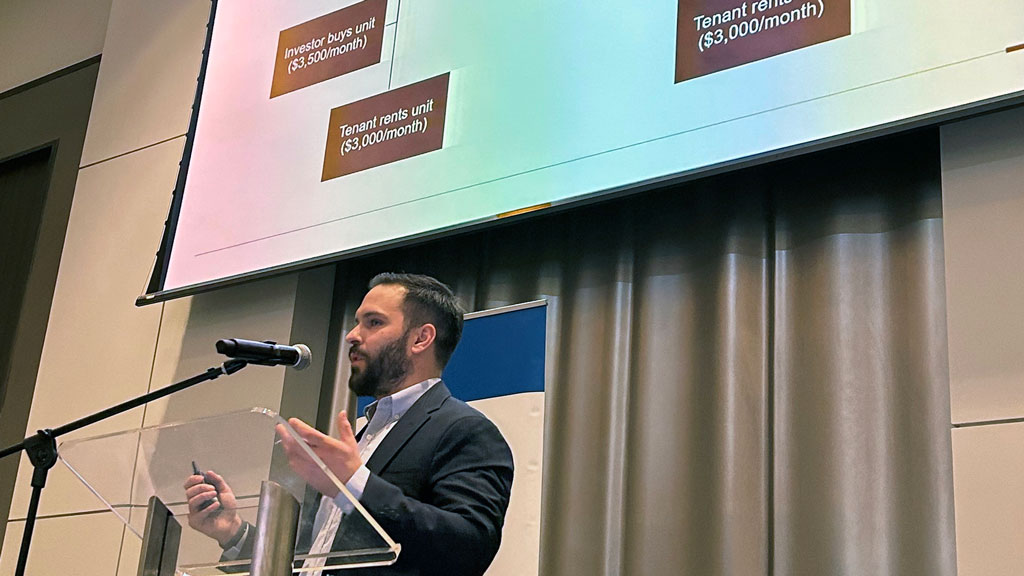During his address at the Residential Construction Council of Ontario’s (RESCON) AGM, Daniel Foch, director of economic research at RARE Real Estate Inc., talked about a program for builders who want to own rental properties.
In his presentation, Between the Lines, he spoke about affordable housing specifically.
Since 2017, construction costs in Canada have gone up 71.4 per cent, with the bulk of that growth taking place since the global pandemic, states research from RESCON and CANCEA. Toronto saw the second largest increase in construction costs since 2020.
“It’s easy for the government to say to people in this room, ‘We just need to build houses.’ It’s easy for us to go back to them and say, ‘Well just approve more.’” said Foch, who also has a podcast called The Canadian Real Estate Investor.
“This is obviously a headwind for us being able to accomplish that goal of just building more.”
He said 2023 was one of the worst years for preconstruction and new condo sales in recent times.
“A lot of people ask me when are people going to start buying houses again? When are house prices going to go up again? The answer is very simple: house prices will go up again when people can afford to buy,” he stated. “They can’t afford it.”
According to the data, most of the increases in housing starts are coming from purpose-built rental whereas built-for-sale is falling off of a cliff because nobody is lining up to buy them anymore, said Foch.
He said he considers a unit to be affordable if it can be rented or consumed for cheaper than the cost of owning it.
“In order for an affordable housing unit to be created, an investor would buy a condo off of one of the builders in the room and their mortgage payment would be, for example, $3,700 a month, which is a mortgage payment on the average condo,” he explained. “But that condo would only rent for maybe $3,500, probably more likely $3,000.”
That investor is willing to sacrifice cash flow because they feel that unit is going to go up in value and, in the meantime, it creates affordable rental housing because somebody is renting that unit for less than it costs to own it, he explained.
“Now you don’t have that because prices aren’t going up and nobody thinks prices are going to go up. Capital has contracted pretty much everywhere,” said Foch.
There is nobody to buy that unit in that format, he said, adding the market has dropped by 50 per cent.
“If we want to continue building, which we need to do because there is massive excess demand, we have one of the highest population growths in the world, we move to this new format,” he noted.
The new format is the builder builds the unit and they can qualify through the Canada Mortgage and Housing Corporation’s (CMHC) MLI Select Program, a multi-unit mortgage loan insurance product focused on affordability, accessibility and climate compatibility.
“If you’re a builder and you are building rental housing you can get the cheapest mortgage in the market, the longest amortization in the market, and the highest loan-to-value in the market as long as you hit CMHC’s criteria,” Foch said.
This allows builders to spread out the cost of owning that unit over 50 years rather than 25, like an investor, and it reduces their monthly cost of ownership to, for example, $3,000 a month.
“Let’s say that unit rents for $3,500, now the builder gets to make a profit,” he said. “Rather than making that profit by selling the units, they have to spread that profit out over 50 years. Through this program, what the government is asking builders to do is make money slowly rather than quickly in the pursuit of building affordable housing.”
Builders are more qualified to own rentals than many investors.
“Take a 100-unit building, rather than having 100 different owners…does it make more sense for the same individual who built it, who is familiar with the building, to own that?” Foch asked. “The question is, does this group of people want to take that on and do it on a 50-year amortization because that’s the consequence, that’s the risk you have to take as a builder if you’re going to put rental housing into the market.”
Follow the author on Twitter @DCN_Angela



Recent Comments
comments for this post are closed